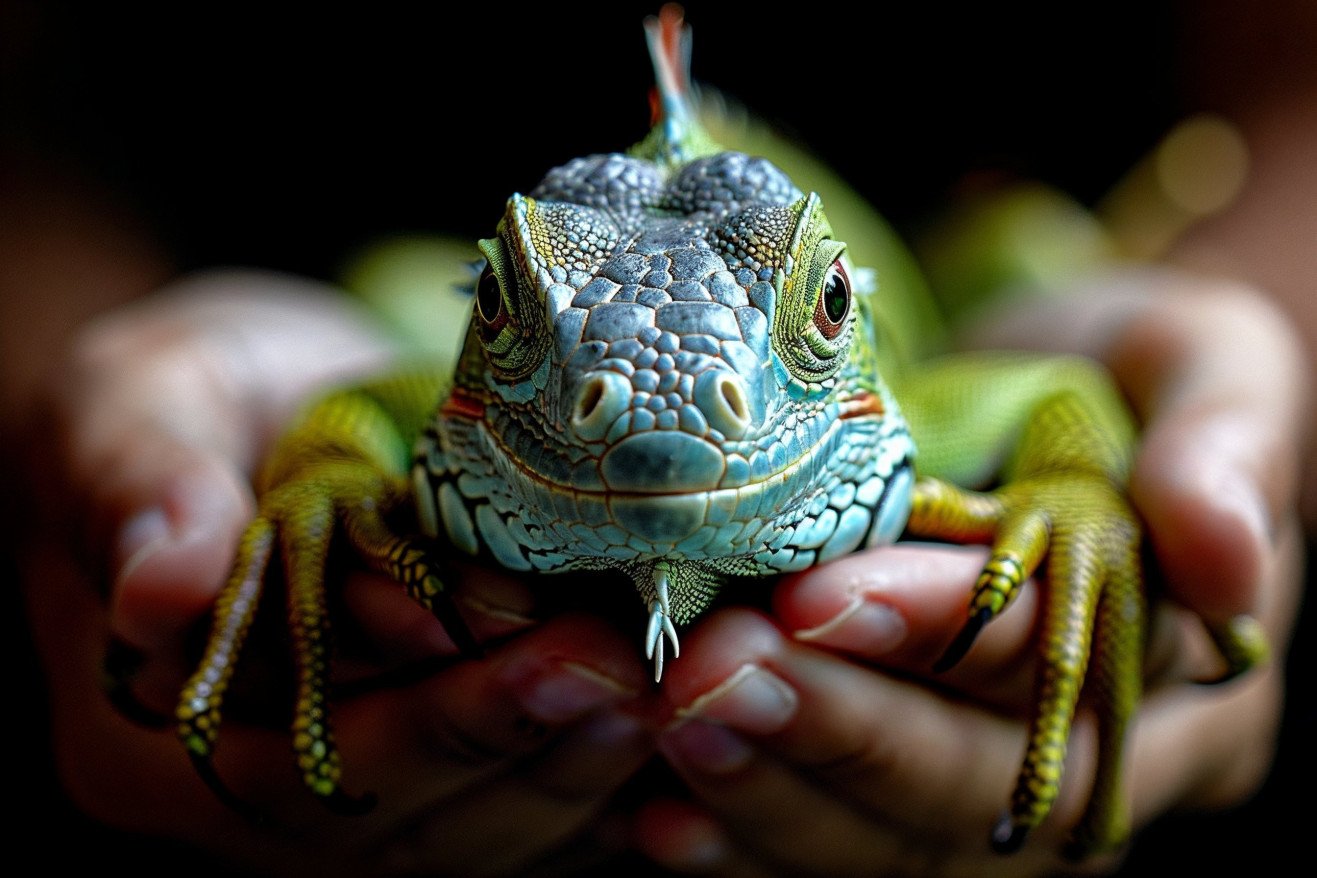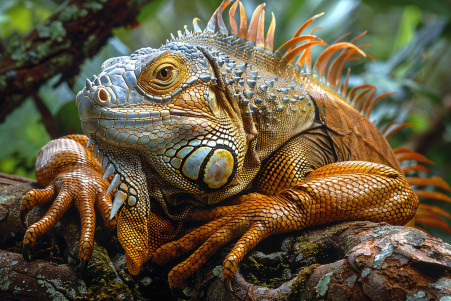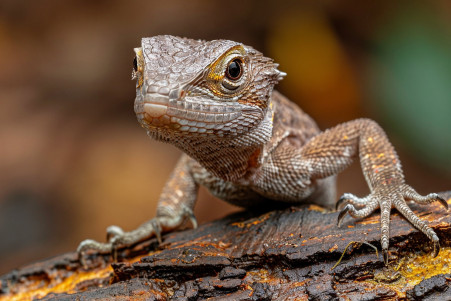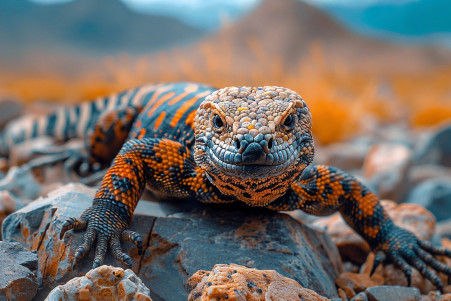Do Iguanas Bite? Understanding Risk and Prevention
15 March 2024 • Updated 13 March 2024

Despite their friendly reputation, iguanas can also be quite unpredictable. This is why iguanas can bite, especially when they are provoked or stressed. Due to their sharp teeth, these bites can be quite serious. To minimize the risk of bites, it’s important to handle iguanas with care and to have a good understanding of their behavior.
This article will review a wide range of research, including ethological studies, veterinary case reports, and behavioral analyses to provide a comprehensive understanding of iguana aggression and bites. By taking this multi-pronged approach, we hope to identify the circumstances that can lead to iguana bites and to outline the best care and handling practices for minimizing the likelihood of bites, thereby ensuring that you can safely and peacefully live with these scaly friends.
Do iguanas bite?
Understanding Iguana Aggression: Behaviors and Triggers
Iguanas rely heavily on body language to express their feelings and intentions, and they will often puff out their throat to make themselves look bigger when they feel threatened or whip their tail as a sign of defense.
It is important to understand these behaviors in order to avoid situations where aggression may occur. A vet from Lexington, KY, lists some common triggers of iguana aggression, which include the natural breeding season that occurs between October and February, and environmental factors like the presence of other animals or sudden movements.
Bright colors can also be a trigger, as well as medical issues that may be causing the iguana distress.
A study on reptile stress responses by Melissa Kaplan explains that stress can lead to a number of destructive behaviors in iguanas, including biting. Changes in their environment or boredom can make these behaviors worse, and iguanas may act out in ways like trying to escape to show that they are uncomfortable.
It is important to be able to recognize these signs of stress and to be able to address the underlying issues before they become a problem.
A study on fecal glucocorticoid response by Otto Kalliokoski found that stressors like inadequate housing or handling can lead to a significant increase in an iguana’s stress hormone levels, which can then lead to aggression. As a result, by learning to recognize and respond to an iguana’s behavioral cues, owners can learn to better control these stressors and have a more peaceful relationship with their reptilian pets.
Evaluating the Risks of Iguana Bites
Although iguana bites are not something that most people talk about, they can cause a lot of tissue damage and serious infections. Their sharp teeth can cause deep cuts, so it’s important to get to a doctor right away so that you can get the proper care for your wound.
Iguanas are known to carry bacteria like salmonella, and they can also carry bacteria that are less common. For example, a case study published in the CDC’s Emerging Infectious Diseases journal reported that a young girl in Costa Rica developed a Mycobacterium marinum infection after an iguana bite.
This slow-growing bacterium, which is usually found in water, caused a delayed reaction that included a lump at the bite site that was growing and wouldn’t go away. The girl had to be treated with antibiotics like rifampin and clarithromycin.
Another bacterial risk after an iguana bite is Serratia marcescens, which was described in a case study in the Journal of the American Academy of Dermatology.
This bacteria caused bullous cellulitis, which is an infection that causes large, fluid-filled blisters.
This shows that it’s important to consider a wide range of potential infectious organisms when treating iguana bites because the standard treatments that are used to prevent infections may not be effective against these less common bacteria.
This is why it’s so important to get medical attention right away after an iguana bite.
If these infections are not treated effectively, they can lead to long-term health problems.
Promoting Safety With Proper Iguana Handling
Learning how to handle iguanas correctly is the first step in reducing the likelihood of iguana bites. For example, The Spruce Pets notes that one of the most important things to do when taming iguanas is to establish a routine that includes regular feeding, cleaning, and handling times.
When it comes to picking up an iguana, it’s important to approach it from the side and use slow, steady movements. It’s also important to make sure that you’re supporting the iguana’s body and that you only put it down when it’s calm so that it learns to associate handling with a positive experience.
In addition, making sure that the iguana’s environment is stress-free is key to reducing the likelihood of aggression. For example, Lianne McLeod, DVM, notes that a clean, roomy enclosure that’s kept at the right temperature and humidity levels can help reduce an iguana’s stress. In addition, people who handle iguanas should avoid handling them and give them a place to retreat during the breeding season, when iguanas are more likely to be aggressive.
Learning to read an iguana’s body language is also an important skill when it comes to preventing bites. For example, signs of aggression can include tail lashing, hissing, and trying to run away. Paying attention to these signs can help handlers avoid unnecessary conflicts and ensure that both the iguana and the person handling it stay safe.
Basic Requirements for Healthy Iguana Behavior
In order to encourage healthy iguana behavior, it’s important to closely replicate their natural environment in their captive setting. This includes giving them plenty of space, since iguanas are known for being active climbers.
While a 20-gallon tank may be sufficient for juveniles, adults will need much more room—think enclosures that are at least 12 feet long and 8 feet high, as All Birds recommends.
It’s also important to create temperature gradients within these enclosures, with a basking area that’s up to 105°F and a cooler end that’s around 70–75°F, and to include a UV light source for vitamin D synthesis, as VCA Animal Hospitals suggests.
A healthy diet is important for iguanas’ overall health and can also play a role in their behavior. Since iguanas are herbivores, they need a diet that’s high in leafy greens and other vegetables, with some fruit mixed in.
The ideal calcium to phosphorus ratio is 2:1, which helps ensure that the iguana absorbs the nutrients it needs, which can help reduce stress and aggression that can be caused by nutritional imbalances. Regular vet visits can help catch health issues before they start to impact an iguana’s behavior.
Enrichment, such as live plants and a variety of climbing branches, can help iguanas exhibit natural behaviors and reduce stress, as the Long Island Bird & Exotics Vet Clinic explains.
It’s also important to be aware of the legal and ethical considerations of owning an iguana, especially in places like southern Florida, where iguanas are considered an invasive species. Being a responsible iguana owner ensures the well-being of the iguana and the health of the environment it lives in.
Iguanas and Human Interactions: A Review of Precautions
We’ve delved into the world of iguanas, discussing their nature, dangers, and the common sense that should be applied to their care. While iguanas can bite, we’ve seen that the risks of being bitten can be greatly reduced by understanding their body language and making sure that their needs are met in their environment. This is especially true when it comes to their mating season, when male iguanas can be at their most aggressive.
The potential dangers of iguana bites, which can cause deep tissue damage and transmit bacteria like salmonella, also make it clear that medical attention should be sought as soon as possible. As reported by The Palm Beach Post, male iguanas, who have serrated teeth, can cause particularly severe bites that require stitches and antibiotics.
Keeping an iguana as a pet is a commitment that goes beyond interest. It is a responsibility that requires a commitment to their welfare and the welfare of their natural habitats, especially in places like Florida where they are an invasive species. In the end, ongoing education and responsible practices are the keys to a successful relationship with iguanas that keeps people safe and the animals healthy.


